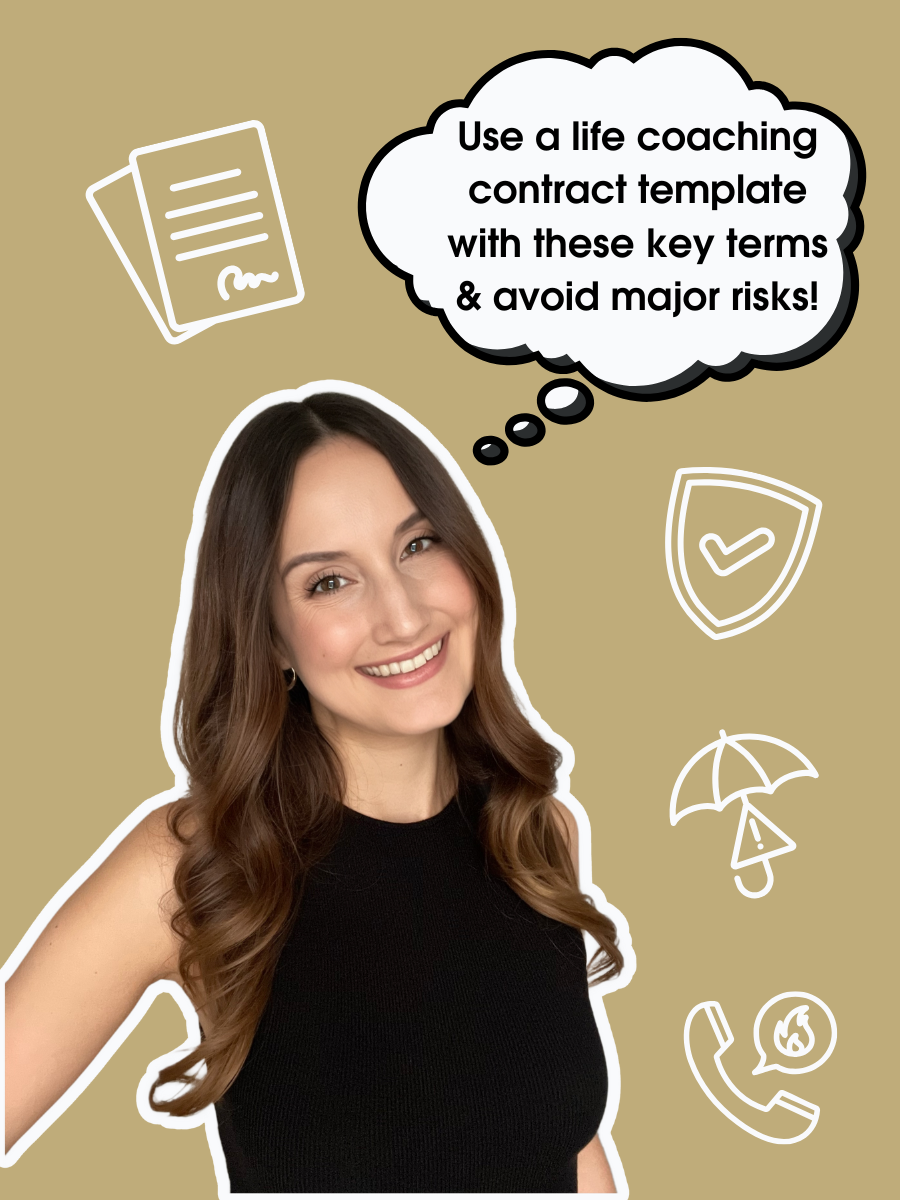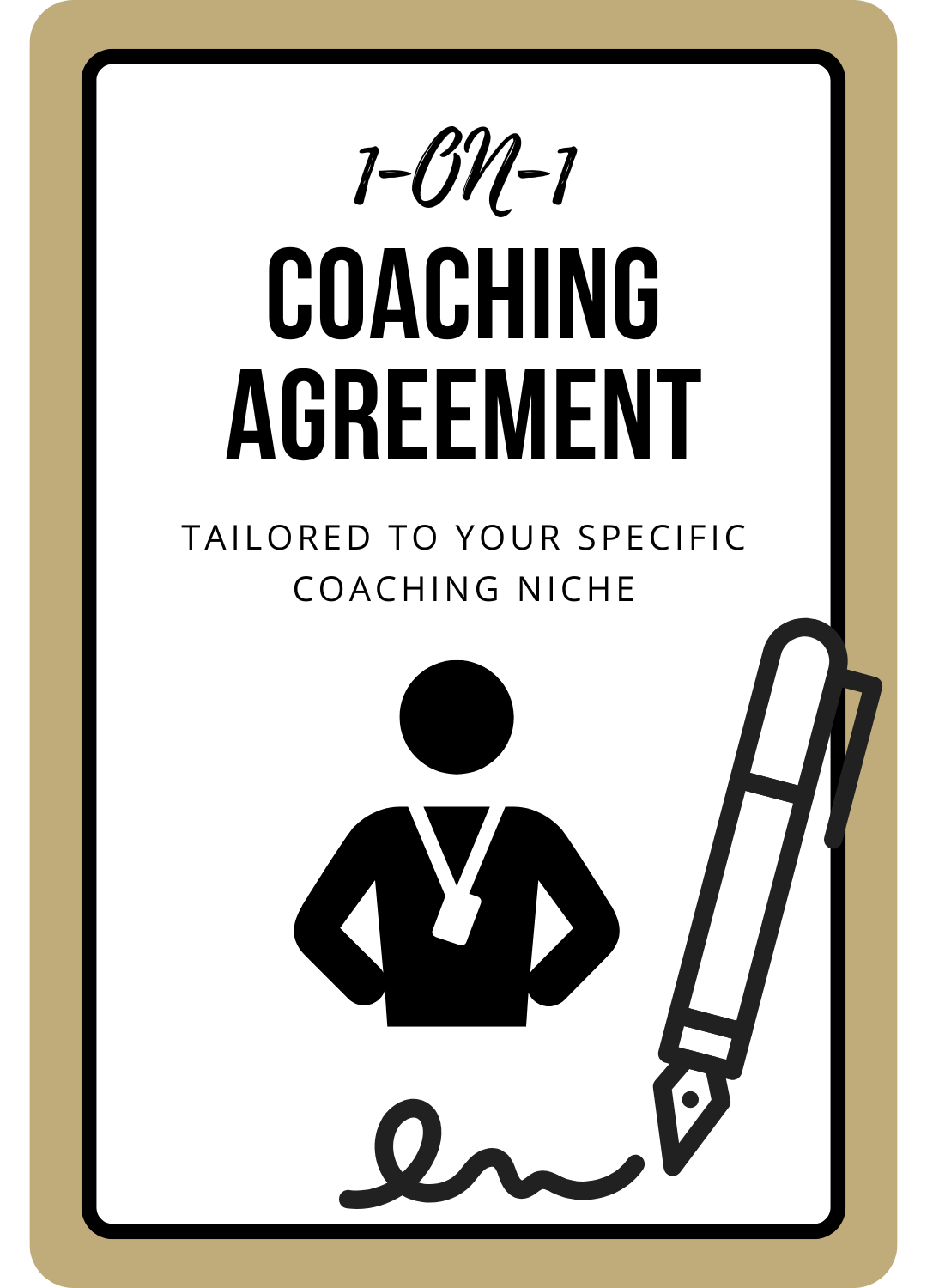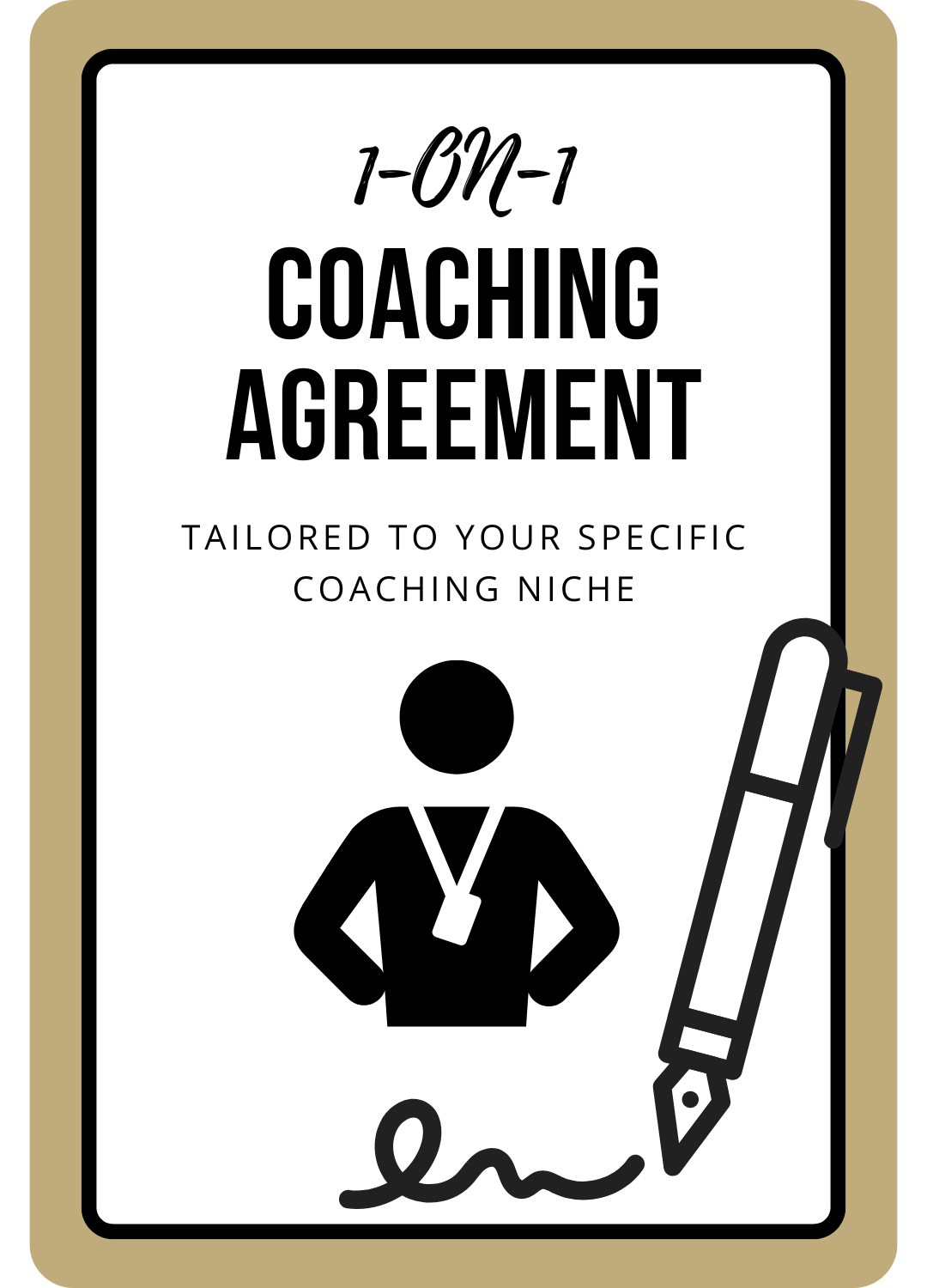11 Key Clauses Every Life Coaching Contract Template Must Include (or Risk Losing Clients & Cash)
Searching for a life coaching contract template that actually protects you? Many coaches grab a random free template online — only to find out later that it’s missing key clauses, written for another country, or far too vague to enforce when something goes wrong.
As a lawyer who works with coaches every day, I’ve seen the same problems repeat themselves over and over: refund disputes, clients who keep pushing your boundaries, or worse — claims that you acted like a therapist or gave “bad advice.”
The truth is, the average life coaching agreement template doesn’t include the legal safeguards you really need to protect your time, income, and intellectual property.
That’s why I’m walking you through the 11 must-have clauses every life coaching contract template needs (and what the average, Simple coaching agreement template leaves out).
We’ll cover everything from payment terms and refund rules to disclaimers, boundaries, and IP protection — so you can stop problems before they start.
👉 Want a done-for-you life coaching contract template? All 13 protections are pre-written inside my 1-on-1 Coaching Agreement, which is fully customizable to your niche.
This post is all about the essentials you need in your life coaching contract template to coach with confidence and keep your business legally safe.
Best Life Coaching Contract Template
The 11 Must-Haves Your Life Coaching Contract Needs (That the Average, Simple Coaching Agreement Template Won’t Have)
1. Scope of Services + “What’s Not Included”
One of the easiest ways coaching relationships go off the rails is when boundaries around your services aren’t crystal clear.
Here’s an example: A client books six sessions, but soon starts asking for “quick” extra calls, daily pep-talk DMs, or advice on topics far outside your program. Without clear limits, you end up doing twice the work for the same fee — and resentment builds fast.
That’s why your life coaching contract template should cover:
The number, length, and format of sessions (for example: six 60-minute Zoom calls).
How and when you’ll check in with clients (e.g., two email check-ins per week).
Any additional services or materials, like workbooks or templates.
A clear “Not Included” section listing what falls outside the package — extra meetings, messaging support, or topics beyond your expertise.
By explicitly outlining what’s excluded, you set healthy expectations from day one and have something concrete to reference when boundaries blur.
Most free templates skip that last part. In fact, they usually just leave a blank space for you to list your deliverables — and that’s it.
✅ My 1-on-1 Coaching Contract Template already includes a complete scope section with space for inclusions and exclusions — just fill in your session details to draw clear lines around your time.
2. Scheduling, Rescheduling & Cancellations
Few things disrupt your coaching schedule faster than last-minute cancellations or endless rescheduling.
Here’s an example: A client books every Tuesday at 10 AM but cancels five minutes before each session and asks for a refund on top of that — leaving you with wasted prep time, an empty slot you can’t fill, and lost income.
That’s why your life coaching contract template should clearly spell out:
How sessions are booked (e.g., through your scheduling tool or by email).
How much notice clients must give to cancel or reschedule (24–48 hours is standard).
What happens if they cancel late, don’t show up, or reschedule too often — for instance, whether you keep 100% or 50% of the fee.
That late cancellations and no-shows are forfeited — no refund, no reschedule.
Firm scheduling terms keep your calendar predictable and ensure you don’t lose money when clients flake.
Most life coaching contracts skip these details. They rarely clarify how far in advance a client can cancel or what happens if they don’t — leaving you to absorb the loss.
✅ My 1-on-1 Coaching Contract Template includes detailed scheduling, cancellation, and rescheduling terms you can fully customize — just plug in your own time frames and policies to stay in control of your calendar.
3. Payment Terms (Upfront & Ongoing Fees)
One of the fastest ways to lose income as a coach is letting clients start before they’ve paid.
Here’s an example: A client books a three-month package and promises to “send the payment tonight.” You deliver the first session — and never hear from them again. Without clear payment terms, you’re left chasing invoices or giving away your time for free.
That’s why your life coaching contract template should clearly spell out:
When payment is due — always before sessions begin.
How payments are made — via card, Stripe, or bank transfer.
What happens if a payment fails, is late, or gets charged back.
Your right to pause all sessions until payment is received.
The average simple coaching agreement template stops at “the client agrees to pay X.” It rarely goes further to include late fees or your right to suspend services if payment isn’t made upfront — and that’s where coaches lose leverage.
Strong payment terms don’t just protect your income; they establish coaching as a professional service, not a casual favor.
✅ My 1-on-1 Coach Contract Template includes fully customizable payment terms — from upfront packages to recurring instalments — so you get paid on time, every time.
4. Refund Policy
Refund fights are one of the biggest headaches for life coaches — and they almost always come down to unclear terms.
Here’s an example: A client completes every session, then emails demanding a refund because “they didn’t get the results they expected.” Without a clear refund clause, you’re stuck in a gray area — and risk feeling pressured to pay back money you’ve already earned.
That’s why your life coaching contract template should clearly define:
When refunds apply (if ever) — such as before the first session only.
When refunds don’t apply — for example, once services have started or if the client cancels late.
How cancellations are handled if the client changes their mind mid-program.
A no-refund rule for partial use of your coaching package.
Just look up any life coaching contract PDF online, and you’ll just see a vague “no refunds” line, but that’s not enough. You need specific language that closes loopholes — especially for clients in regions with consumer withdrawal rights or “cooling-off” periods.
A strong refund clause protects your income and prevents misunderstandings before they happen.
✅ My 1-on-1 Coaching Contract Template includes multiple refund policy options you can choose from — strict, flexible, or hybrid — so you stay in control of your income and avoid refund disputes altogether.
5. Client Warranties — Warranties that a client should be giving you
Not every potential client is a good fit for coaching — and if you don’t vet that properly in your contract, it can backfire fast.
Here’s an example: Partway through a program, a client admits their therapist advised them not to start coaching yet. Suddenly, you’re facing emotional outbursts and claims that your sessions made things worse. Without a clear warranty clause in your contract for your client, you have no contractual grounds to end the engagement safely.
That’s why your life coaching contract template should require clients to confirm key facts before coaching begins. Clients should warrant that they:
Are mentally and emotionally fit to participate in coaching.
Are not currently undergoing therapy or medical treatment that conflicts with coaching.
Will behave respectfully and communicate appropriately.
Will provide accurate information and have the legal rights to any materials they share.
Will update you if their situation changes.
Most life coaching contracts leave this out completely — or only include a vague “client agrees to cooperate” line. But these warranties shift responsibility back where it belongs: on the client. They give you clear grounds to pause or terminate the contract if the client misrepresents themselves or becomes disruptive.
✅ My 1-on-1 Coaching Contract Template is fully customizable into a life coaching contract template and includes specific client warranties for life coaches covering (mental) health, honesty, and conduct — so you can work only with clients who are truly ready (and respectful) to be coached.
6. Professional Disclaimers (you’re not a therapist)
One of the biggest legal risks for life coaches is being mistaken for a therapist, doctor, or financial advisor.
Here’s an example: During a session, you discuss mindset and health habits, and later the client claims you provided “psychological treatment.” Without a professional disclaimer, they could argue you acted beyond your qualifications — and you’d have no written proof otherwise.
That’s why your life coaching contract template needs a clear disclaimer separating coaching from therapy, medical, legal, or financial advice.
It should explain that:
Your coaching is for educational and informational purposes only.
You’re not acting as a licensed professional in any field unless stated otherwise (even if you are also a licensed therapist).
Coaching is not a substitute for therapy, medical treatment, or legal/financial guidance.
Most life coaching contracts are actually generic service agreements that don’t include these robust disclaimers for life coaches. A well-written disclaimer protects your boundaries and your liability.
✅ My 1-on-1 Coaching Contract Template is fully customizable into a life coaching contract template, including niche-specific disclaimers for your niche — so you’re protected against specific risks in your niche.
7. Results & Outcomes Disclaimer
Every coach knows you can guide clients toward transformation — but you can’t guarantee it.
Here’s an example: A client expects massive life changes after just a few sessions — a new relationship, a dream career, total confidence overnight. When that doesn’t happen, they blame you for “failing to deliver results.” Without a results disclaimer, you could end up defending outcomes you should never be held for.
That’s why your life coaching contract template should include a results disclaimer that makes it clear:
Coaching supports growth and development, but results are never guaranteed.
Clients are responsible for applying what they learn and taking consistent action.
You’re not liable if they don’t achieve their personal or professional goals.
Any examples or testimonials are illustrative only, not promises of outcomes.
A strong coaching disclaimer ensures clients understand that you provide tools and guidance, but they’re responsible for their own results.
✨ Want a Life Coaching Contract Template That Includes All the Protections You Need?
All 13 protections are already written for you — from refund and results disclaimers to boundaries and client conduct rules, and more!
With my 1-on-1 Coaching Contract Template, you’ll:
✅ Get a lawyer-drafted contract that’s fully customizable to any coaching niche, including life coaching.
✅ Protect your income, time & boundaries with clear clauses.
✅ Include professional & results disclaimers tailored to your niche.
✅ Keep your methods & materials legally yours.
👉 Grab the 1-on-1 Coaching Contract Template now and coach with confidence knowing every clause is already done for you.
8. Client Conduct, Non-Disparagement & Reputation Protection
Not every client will treat you with respect — and when they don’t, it can get ugly real fast.
Here’s an example: A client becomes argumentative during sessions, refuses to cooperate, and later posts negative, misleading comments about you online. Without clear behavioral and brand protection clauses, you have little power to address the situation or end the engagement on your terms without having to pay them back.
That’s why your life coaching contract template should include clauses on client conduct and non-disparagement that:
Require clients to behave respectfully during all communications.
Allow you to terminate the agreement immediately (without having to refund that client) if a client is abusive, harassing, or disruptive.
Prevent clients from making unsubstantiated public claims or reviews that harm your reputation.
Most coaching contracts focus only on money and scheduling. They skip these behavioral and brand protections entirely, leaving you vulnerable to staying stuck in toxic client relationships.
✅ My 1-on-1 Coaching Contract Template already includes built-in conduct and non-disparagement clauses, so you can protect both your boundaries and your reputation if a client crosses the line.
9. Protections for Your Coaching Methods & Workbooks
Your coaching tools, frameworks, and worksheets are part of what makes your program unique — but once you share them, they can easily be copied or resold without your permission.
Here’s an example: A past client takes your signature “Mindset Reset Workbook,” rebrands it, and starts using yourworkbook in their own coaching program.
That’s why your life coaching contract template should include strong intellectual property protections that:
Clarify that all methods, frameworks, and materials remain your property.
Limit client use of materials to personal, non-commercial purposes only.
Prohibit clients from copying, sharing, reselling, or republishing your content.
Most generic life coaching contracts only say “the coach retains intellectual property rights,” — but that doesn’t clearly define what clients can and can’t do. You need plain-English terms that make your rights unmistakable.
✅ My 1-on-1 Coaching Contract Template includes detailed IP clauses written specifically for coaches — so your worksheets, frameworks, and methods stay yours, no matter who you share them with.
10. Time & Contact Boundaries
One of the fastest ways to burn out as a coach is by not protecting your time.
Here’s an example: A client starts sending you long voice notes at midnight, expects instant replies, and messages you every time they need a pep talk. Before long, you’re working 24/7 — and feeling resentful instead of energized.
That’s why your life coaching contract template should clearly define your availability and communication rules, including:
Your working days and hours (for example: Monday–Friday, 9 AM–5 PM).
Which communication channels you use (such as Zoom for sessions and email for check-ins).
How quickly clients can expect a response.
With these boundaries, you protect your energy and ensure clients respect your time just as much as you respect theirs.
Most life coaching contracts skip this section entirely, leaving you to constantly remind clients what’s appropriate (and what’s not).
✅ My 1-on-1 Coaching Agreement Template includes a pre-written boundaries section so that you can set clear expectations upfront in your life coach contract.
11. Limitation of Liability
Even the best coaching relationships can go wrong if expectations aren’t aligned — and without a limitation of liability clause, you could end up being blamed (and even sued) for things completely outside your control.
Here’s an example: A client claims your advice “ruined” their relationship, career, or entire life. Or they say they experienced emotional distress after a session. Without a limitation of liability clause, there’s nothing in writing to cap your exposure or confirm that clients are responsible for their own choices.
That’s why your life coaching contract template should include a limitation of liability clause that:
Clarifies you’re not responsible for indirect, incidental, or consequential losses.
States that the client is responsible for their own decisions, actions, and outcomes.
Includes indemnities requiring the client to hold you harmless from any claims made by third parties — for example, if they misuse your materials, share confidential information, or act on your advice in ways that harm others.
Caps your total liability, in any case, to the amount paid for your services (even if a court determines you were partly at fault).
Most life coaching contracts leave gaps that expose you to exaggerated claims or unrealistic expectations. Proper disclaimers, limitations of liability, and indemnities keep risks proportionate and make it clear where your responsibility ends.
The Best Life Coaching Contract Template Free of Fluff
Your life coaching contract template is what should protect your income, time, and reputation. Instead of guessing what to include or what the right template is for your coaching business, you can start with a lawyer-drafted template that already covers every protection a coach needs.
✅ My 1-on-1 Coaching Contract Template includes:
Crystal-clear scope, boundaries & refund rules — stop scope creep, cancellations, and refund drama before they start.
Strong payment & scheduling protections — get paid upfront and keep your calendar running smoothly.
Professional & results disclaimers — clearly separate coaching from therapy and manage client expectations.
Reputation & IP safeguards — protect your methods, materials, and credibility from misuse or defamation.
Solid legal protections — confidentiality, limitation of liability, and client warranties that keep risks under control.
👉 Get the 1-on-1 Coaching Contract Template now and coach with confidence knowing every essential clause is already written and ready to customize for your niche.
This post was all about the 11 key clauses your life coaching contract template must include to protect your business, income, and boundaries.
Other posts you may like:






